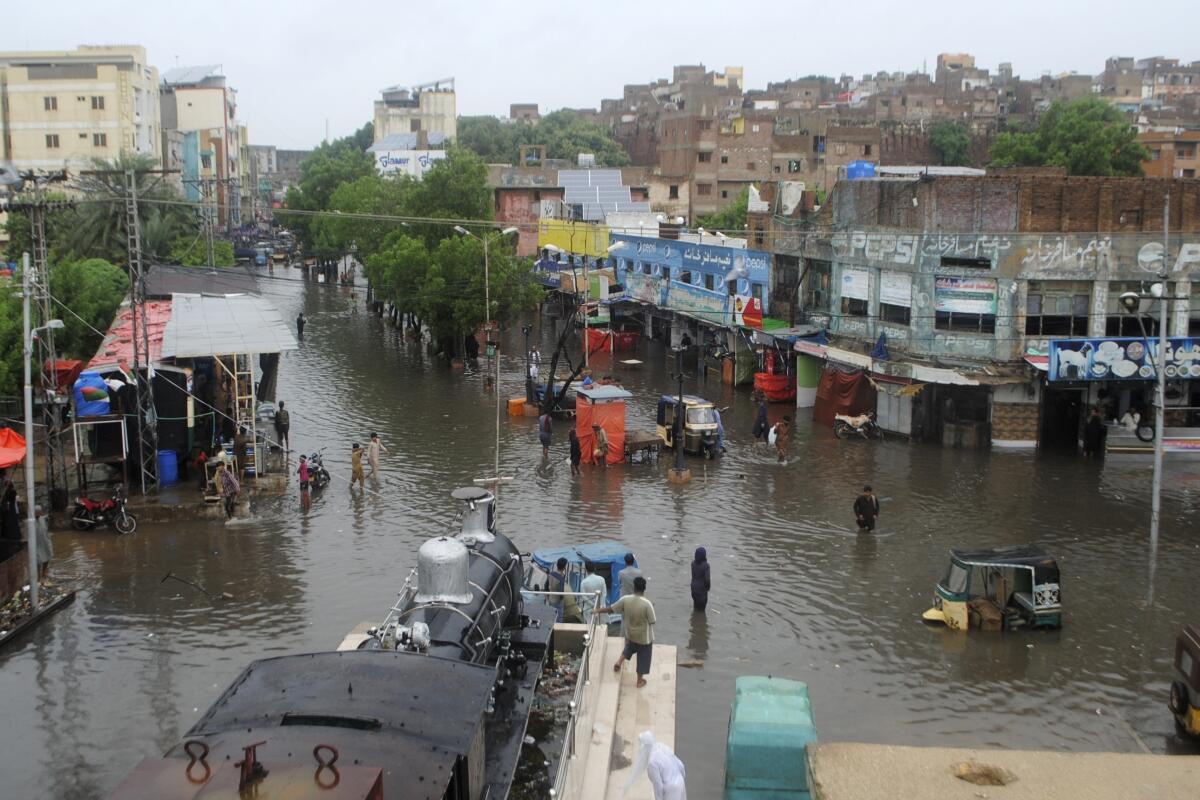How to help Pakistan as it struggles with relentless flooding

- Share via
The wettest August in Pakistan since 1961 has killed 1,300 people and washed away thousands of homes, displacing more than 33 million people.
The incessant rainfall in the provinces of Sindh and Baluchistan has submerged whole communities, and the threat of cholera, dengue and other waterborne diseases looms.
Local, national and international organizations are aiding the country, including UNICEF, which said relief and rescue operations remain “extremely hard to carry out” because “many communities are still cut off by floodwater.” It says it has been working closely with the government and other partners to get children in the affected areas the critical support they need as soon as possible.
In addition to UNICEF, here are some of the local, national and international efforts looking for your help to support the flooding victims in Pakistan.
The Citizens Foundation — Young Professionals Los Angeles
What it does: The Citizens Foundation’s Los Angeles chapter is made up of social workers, philanthropists and community activists trying to make a difference in the lives of young children through education. The chapter is part of a larger organization that funds schools and educational programs for underprivileged children in Pakistan.
How you can help: TCF school communities in Baluchistan and Sindh have been overwhelmed by the flooding, and other areas in Khyber Pakhtunkhwa and southern Punjab are at risk. Many of the schools in those areas are flooded or serving as refuge for displaced families. The organization has created the TCF Flood Relief Appeal to help address immediate needs and fund repairs in the future. You can make a one-time or monthly monetary donation on the group’s website.
Direct Relief
What it does: The Santa Barbara-based nongovernmental nonprofit mobilizes essential medicines, supplies and equipment to aid disaster victims around the world.
How you can help: In August, Direct Relief prepared a 23-pallet shipment containing chronic care medications, trauma supplies, hygiene kits, anti-seizure medications, personal protective equipment and prenatal vitamins to Pakistan. The supplies will be distributed to public health facilities providing care to 33 million people that were affected by widespread flooding. You can support the organization’s efforts by making a one-time or monthly monetary donation.
Islamic Relief USA
What it does: Islamic Relief USA spearheads relief efforts and collaborates with other aid groups to deliver humanitarian assistance faster and more efficiently.
How you can help: In the coming year, Islamic Relief plans to help rebuild Pakistan by reconstructing damaged homes and infrastructure, revitalizing the agricultural sector, establishing shelters for women and children and providing mental health services. It will also continue to support the country through food aid and cash assistance. To support these efforts you can make a one-time or monthly monetary donation.
Shahid Afridi Foundation
What it does: This nonprofit organization in Pakistan has chapters in the U.S., U.K., Australia and South Africa. Its mission is to spread education, healthcare services and access to water across Pakistan in order to empower underprivileged communities.
How you can help: Under the organization’s Emergency Relief Response project, the group has provided support to those affected by flooding in Baluchistan and Sindh. As of Aug. 24, the organization has assisted 4,000 households. The funding goes toward providing people with nonperishable food, tents, clothes and other essentials. To support the emergency project, you can make a one-time or recurring monetary donation.
International Rescue Committee
What it does: Active in Pakistan since 1980, the International Rescue Committee recently launched an emergency response to provide immediate assistance to those affected.
How you can help: IRC’s latest assessment shows people are in urgent need of food, drinking water, shelter and healthcare. The organization says that, according to everyone it surveyed, women and girls do not have access to menstrual hygiene products. IRC has been able to provide 50,000 women and girls with dignity and hygiene kits to meet this need. Since early July, it has also extended emergency supplies to nearly 950,000 people in Baluchistan, Khyber Pakhtunkhwa and Sindh. To support these efforts, IRC is accepting monetary donations.
About The Times Utility Journalism Team
This article is from The Times’ Utility Journalism Team. Our mission is to be essential to the lives of Southern Californians by publishing information that solves problems, answers questions and helps with decision making. We serve audiences in and around Los Angeles — including current Times subscribers and diverse communities that haven’t historically had their needs met by our coverage.
How can we be useful to you and your community? Email utility (at) latimes.com or one of our journalists: Jon Healey, Ada Tseng, Jessica Roy and Karen Garcia.
More to Read
Sign up for Essential California
The most important California stories and recommendations in your inbox every morning.
You may occasionally receive promotional content from the Los Angeles Times.











